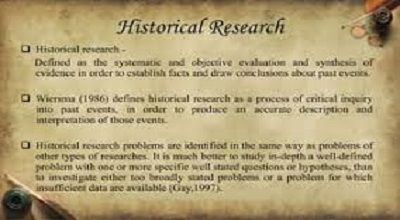Historical Research Review
Historical Research is a systematic and objective study of past events and their significance. Using a variety of sources to reconstruct the events, people, and social, cultural, economic, and political contexts of a particular time and place. It involves collecting and analyzing primary sources, such as letters, diaries, government documents, photographs, and artifacts, as well as secondary sources. Such as books, articles, and other scholarly works, to develop a comprehensive understanding of the past.
Historical research is conducted by historians, scholars, and researchers who seek to understand the past and its impact on the present. It is a critical tool for understanding the origins and development of social, political, economic, and cultural phenomena. And for developing insights into the complex relationships between different historical factors.
H-Research is used in a variety of fields, including history, anthropology, sociology, political science, economics, and cultural studies. It helps scholars to analyze patterns and trends over time, and understand the impact of historical events and movements. And develop theories and hypotheses about the causes and effects of social and cultural change.
Types & Methods Of Historical Research
There are various types and methods of historical research, which can be categorized as follows:
Historical Research Methods:
- Archival research – using primary sources found in archives, museums, and other repositories.
- Oral history – interviewing individuals who have lived through the period or event being studied.
- Statistical analysis – examining quantitative data from historical records.
Historical Research Types:
- Political history – focuses on political events, systems, and institutions.
- Social history – examines the everyday lives of ordinary people and social structures.
- Cultural history – explores the cultural beliefs, practices, and artifacts of a particular time and place.
- Economic history – studies economic systems, trends, and developments over time.
Comparative Research:
- Comparative historical research – comparing and contrasting historical events and trends across different cultures or time periods.
- Transnational history – examining how historical events or trends have impacted multiple nations or regions.
Interdisciplinary Research:
- Historiography – analyzing the methods, theories, and debates within the field of historical research.
- Environmental history – exploring how the natural environment has influenced historical events and societies.
- Digital history – utilizing digital tools and methods to analyze and present historical data.
Overall, the methods and types of H-Research can vary depending on the research question. The available sources, and the disciplinary perspective of the researcher.
Historical Research In Education
Historical research in education involves examining past practices, policies, and experiences related to education. The aim of this research is to understand how education has evolved over time and the factors. That has influenced its development, and how it has impacted society. There are several key areas of focus within H-Research in education, including:
Educational Policy and Practice:
Historical research in education can examine the evolution of educational policies and practices over time. This research may involve analyzing the impact of policies on educational outcomes and exploring the factors. That led to changes in policies, and examining how educational practices have shifted over time.
Curriculum Development:
Historical research in education can explore the development of curricula and teaching methods over time. This research may involve analyzing the goals and objectives of educational programs. Examining how curricula have changed over time, and exploring the factors that have influenced curriculum development.
Educational Institutions:
Historical research in education can also focus on the evolution of educational institutions, such as schools, universities, and training programs. This research may involve examining the development of different types of institutions and exploring the factors. That has influenced their growth, and analyzing the impact of institutional changes on educational outcomes.
Educational Movements and Reform:
Historical research in education can also explore the evolution of educational movements and reforms. This research may involve analyzing the goals and objectives of these movements. Examining the strategies used to achieve reform, and exploring the impact of educational reforms on society.
Overall, historical research in education provides insights into the development of education systems. Policies, and practices, and how they have impacted society over time. This research can inform current educational practices and policies, and help to shape future developments in the field.
Conclusion
In conclusion, Historical Research is a critical tool for understanding the past and its impact on the present. It involves the systematic and objective study of past events. Using a variety of sources to reconstruct the events, people, and social, cultural, and economic. And political contexts of a particular time and place. H-research can be conducted using various methods. Such as archival research, oral history, and statistical analysis, and can focus on different areas.
Such as political history, social history, cultural history, and economic history. H-Research in education is particularly important for understanding the evolution of educational policies, practices, and institutions. And how they have impacted society over time. Ultimately, H-Research helps us to develop a deeper understanding of the complexities of the past. And how they continue to shape our present and future.
